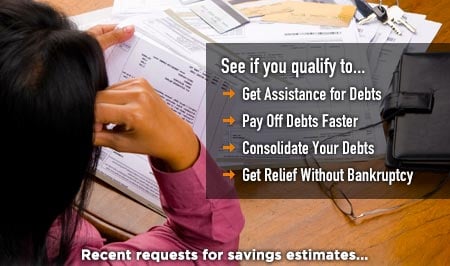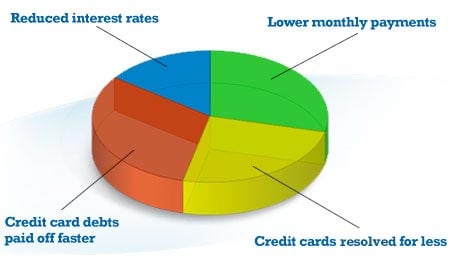Debt Relief – How It Works

Over the years one of the most common questions we get from people who come to our site is "How does it work?"
This video explains how the free debt relief savings estimate works, how debt relief programs work and if there is any cost.

Consolidate Your Debts
& Save
Consolidate Your Debts and Save
If you need to get relief from multiple high interest credit cards or other unsecured debts – such as medical bills, store charge cards, gas cards, or more – a debt consolidation program may be able to help you get out of debt much faster. This could, not only help to reduce stress, but also save you a substantial amount of money.
Debt consolidation programs, also known as debt management plans (or DMPs), are typically coordinated through a credit or debt counselor who will take the time to go over your current financial situation, look at your unsecured debts, look at how much you can afford to pay each month toward your debts, then submit proposals to creditors on your behalf requesting relief.
Overall, the goal of a debt consolidation program is to provide you with a proven and predicable way to combine or "consolidate" all your debts into a single payment each month by providing a personalized plan that, if followed each month, can help you get out of debt at an accelerated rate.
Debt consolidation could help you:
- Reduce Your Interest Rates
- Lower Monthly Payments
- Remove Late Fees and Penalties
- Simplify Your Life with One Payment
- Help You Get Out of Debt Faster

Lower Your Monthly Payments
Lower Your Monthly Payments
If you are faced with credit cards and other debts that have made your bills very difficult to manage on your own, a debt relief program may, not only be able to help you get out of debt – but also lower your payments each month. Depending on your current situation, debt relief may also be able to help reduce your interest rates, remove late fees and penalties, or even resolve credit card debts for much less than you owe.
With your free debt analysis and savings projection, a debt relief specialist will take the time to go over your current financial situation then customize a debt relief program for you, based on how much you can afford each month.

Pay off Credit Card
Debts Faster
Get Rid of Credit Card Debt Faster
If you have high interest, or high balance credit cards, you may be on a "credit card
debt treadmill" that has become very stressful, and more than you can handle on your own. While avoiding non-essential credit card purchases, and paying down your debts each month, can help you get out of debt – a proven debt relief program may be able to help you get out of debt considerably faster.
Depending on your current financial situation, there are several debt relief programs that may be able to provide you with much needed credit card relief, including:
- Debt Consolidation Program (Reduce interest, waive late fees and penalties, consolidate high interest debt into one lower monthly payment)
- Debt Resolution Program (Resolve high balance credit card debt for much less than you currently owe)
Depending on the debt relief program that best meets your needs, your free debt relief evaluation can provide you with a projection of how much debt relief could save you – as well as the estimated time required to get out of credit card debt.

Reduce Your Interest Rates
Reduce Your Interest Rates
If you have high-interest credit cards and other debts and are need of relief – a debt consolidation program could simply your life, help you save money, and get out of debt faster by reducing your interest rates. Though a free debt relief analysis, a debt
specialist will go over your existing debts, current interest, and financial situation – then make proposals to each of your creditors on your behalf, requesting lower interest rates and often more favorable repayment terms.
Each creditor who agrees to the proposals are then added to the "debt management plan" – which can not only lower interest rates and remove late fees and penalties – but also help you get on a faster track to get out of debt.

Resolve Credit Cards for Less?
Resolve Credit Card Debts for Less?
If you have one or more high-balance credit card debts and need to "resolve" your debt for less than you owe – a credit card debt resolution program could save a substantial amount of money.
When credit card companies decide to sell off their "bad debt" to debt collection agencies, it is not unusual for credit card companies to sell the debt for as little as ten cents on the dollar. This is not to say that credit card companies will agree to "resolve" credit card debt for as little as ten percent of the amount owed, but it stands to reason that credit card companies are often willing to accept a reasonable offer from consumers in distress who offer to pay what they can afford.
A personalized debt relief analysis can provide a savings estimate for credit card resolution. How much debt resolution could save depends largely on the amount of credit card debt involved, the debtor's current financial situation – and the resolution policies of individual creditors.














